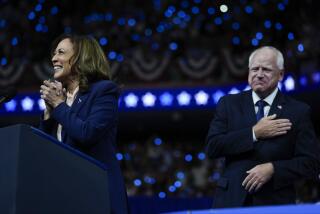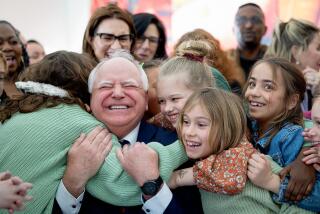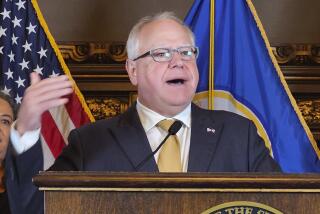The Ticket for Clinton? Everyone Has an Idea : Campaign: Suggestions for the vice presidential spot are pouring in, but few fill that combination of glitz and stability.
- Share via
LITTLE ROCK, Ark. — Now comes the veepstakes, wherein every living Democrat with a political title is hoisted aloft for consideration as vice president to putative presidential nominee Bill Clinton.
From an audience of coal miners in West Virginia last week came one suggestion: What about Sen. Jay Rockefeller?
“He’d be a good one,” the Arkansas governor said noncommittally. “I’ve known him so long, been looking up to him for so long, that he’d certainly keep me humble. Which is an important thing.”
From an Oregon radio station, the same question, different subject: What about Gov. Barbara Roberts? “Very impressed with Barbara Roberts,” Clinton said. “She is an exceptional governor and increasingly is going to be recognized as a national leader.”
From the crowd in Omaha at a late night rally Sunday: What about Sen. Bob Kerrey?
“You know that I think the world of him,” said Clinton.
With the nomination now seemingly a foregone conclusion, attention outside and inside the Clinton campaign is turning to the ticket’s second slot.
The governor himself, while praising potential vice presidential nominees across the country, refuses to issue a list, short or long. But the process by which he will select a running mate--and the person who will guide the search--is expected to be announced this week, Clinton campaign officials said.
Like every presidential nominee before him, Clinton takes pains to say that he will strive to select the best person for the job. Or, as he puts it, someone “capable of being President if I should drop dead the day after I get inaugurated.”
He regularly cites President Bush’s selection of then-Indiana Sen. Dan Quayle in 1988 as a poor and politically motivated choice.
“President Bush was badly damaged by the perception that he picked Dan Quayle at the last minute, without a lot of thought, for political purposes,” said Clinton. “That is, he was a generation younger, from an industrial state in the Midwest and he came from the conservative wing of the Republican Party.”
Notwithstanding Clinton’s pleas, some sort of political necessity frequently dictates the vice presidential selection.
In 1960, Massachusetts Sen. John F. Kennedy picked Lyndon B. Johnson of Texas to provide regional, political and stylistic balance to the ticket. Twenty-eight years later, Michael S. Dukakis replicated the Boston-Austin axis by selecting Sen. Lloyd Bentsen of Texas as his running mate. Another Southern governor running as an outsider, Jimmy Carter, saw wisdom in picking a veteran Washington insider, Sen. Walter F. Mondale of Minnesota.
When his turn came eight years later, the staid Mondale tried to add some pizazz to the ticket by selecting then-Rep. Geraldine A. Ferraro of New York, the first woman on a major party ticket.
In Clinton’s case, the conventional thinking is that he will look first to a senator or another official experienced in foreign policy or military affairs to offset Clinton’s lack of experience in that quarter.
Clinton campaign aides have talked longingly about persuading Joint Chiefs of Staff Chairman Colin L. Powell to join the ticket with his unchallenged international credentials. Powell, who has not commented on that possibility, is believed to be a political independent.
“The ideal vice presidential candidate for Bill Clinton is at once reassuring and thrilling,” said Democratic political consultant Ann Lewis. Except for Powell, she added, “the reality is that you have to choose one or another.”
In rumor-heavy political circles, talk runs to a host of reassuring senators: Bill Bradley of New Jersey, who has said he will not accept the job; George J. Mitchell of Maine, the Senate majority leader; John D. (Jay) Rockefeller of West Virginia; John Kerry of Massachusetts.
Former foes Bob Kerrey of Nebraska and Tom Harkin of Iowa are also on the rumor list, although neither would provide any geographical benefit and Kerrey has yet to even endorse Clinton. Former Massachusetts Sen. Paul E. Tsongas, who has shied away from discussing the vice presidency, is believed to have fallen from grace since he acknowledged a second, little-known episode of cancer occurred after the bone marrow transplant that he had long said rid him of the disease.
Democrats would dearly love to have a candidate who could give them the edge in California, which is expected to be the most hard-fought state in the fall election. But there are no obvious in-state prospects.
“The ideal candidate is Dianne Feinstein, having just been elected to her second term (in the U.S. Senate) and on the Senate Foreign Relations Committee,” Lewis said wryly.
Lewis was intentionally underscoring the absence in the potential field of a woman with foreign policy or military credentials. Rather than being in her second term, of course, Feinstein is just now running for her first term in the U.S. Senate. Her overseas experience is limited to her tenure as San Francisco’s mayor and her private travels.
Some Democrats suggest it is improbable that Clinton will reach beyond the stable of white male senators and pick an untraditional running mate. Most of the nation’s ranking women politicians are governors, like Clinton, and would seem to duplicate rather than complement his strengths.
One potential problem is Jesse Jackson, who twice before has sought the presidency and has made his interest in the 1992 vice presidency well known.
“I’ve got the experience and I’ve got the votes,” Jackson told the New York Daily News last month.
Clinton campaign officials do not publicly agree that the list will ultimately come down to Senate insiders.
“The campaign’s objective is to cast the net far and wide and look at some unconventional (candidates),” campaign spokeswoman Dee Dee Myers said.
In style, Clinton’s campaign is seeking to model its selection effort after Dukakis’. Clinton has made it known he wants to avoid the political sideshow that developed in 1984, when nominee Mondale interviewed potential running mates at his Minnesota home, their comings and goings in full view of camped-out reporters.
At every campaign stop at which the running-mate question arises, Clinton is quick to say that he hopes to keep the process somewhat private.
“If you have quite a long list, then you look like you’re basically playing with people’s feelings or interests or trying to gain some political advantage,” Clinton told one questioner in the San Fernando Valley on Saturday.
Clinton stayed in Little Rock on Monday but spoke via satellite to a San Francisco meeting of the Teamsters Legislative Conference. He told one questioner there that he was going about the vice presidential search from “sort of a nonpolitical point of view.”
The governor, whose relationship with labor has been uneasy, also vowed to put a labor representative on his White House staff and hinted that a union sympathizer would be high up in the Labor Department.
He also made a pointed pitch for the so-called “Reagan Democrats,” those who swung over to vote for Ronald Reagan and Bush in the last three elections.
“I want to ask the Reagan Democrats, some of them in the Teamsters Union, to come home, to come home to a party that will restore our economic leadership, reduce poverty and bring this country together again,” said Clinton.
Clinton campaigns in Illinois and Minnesota today before heading west for stops in Oregon and California at midweek.
More to Read
Get the L.A. Times Politics newsletter
Deeply reported insights into legislation, politics and policy from Sacramento, Washington and beyond. In your inbox twice per week.
You may occasionally receive promotional content from the Los Angeles Times.











